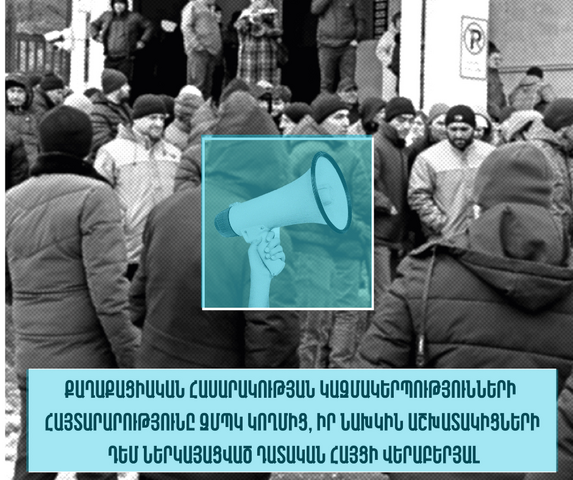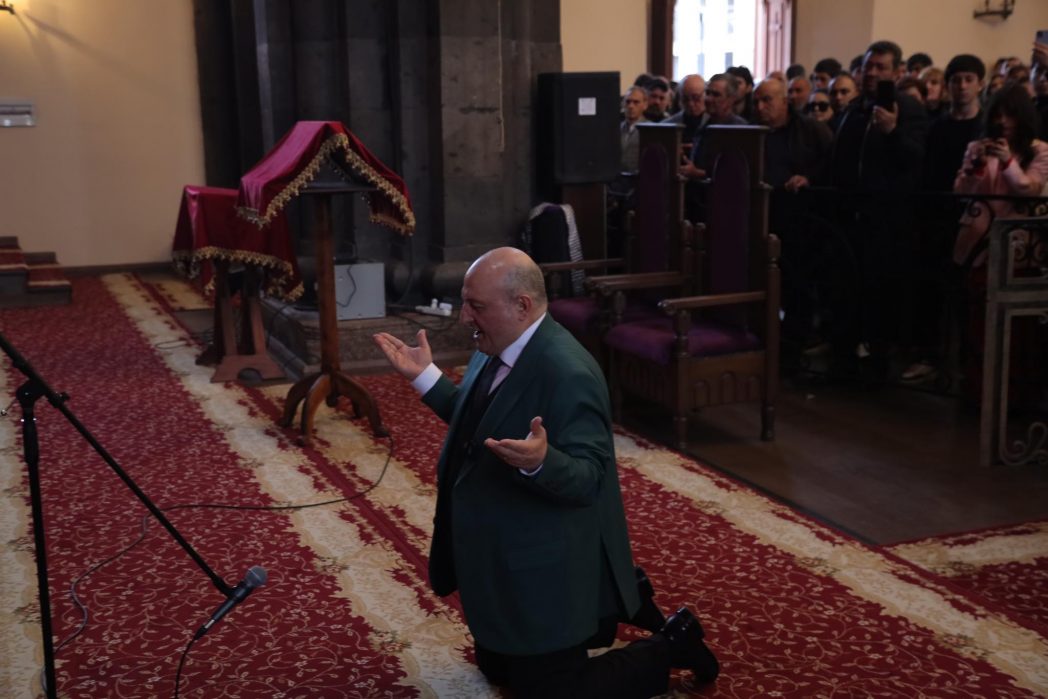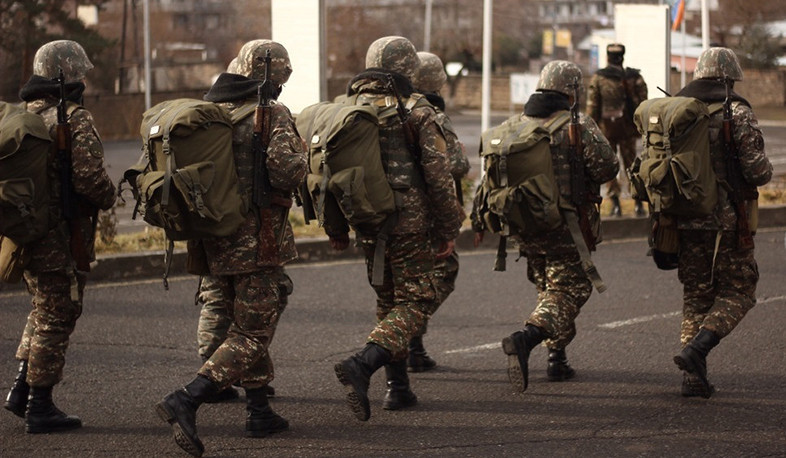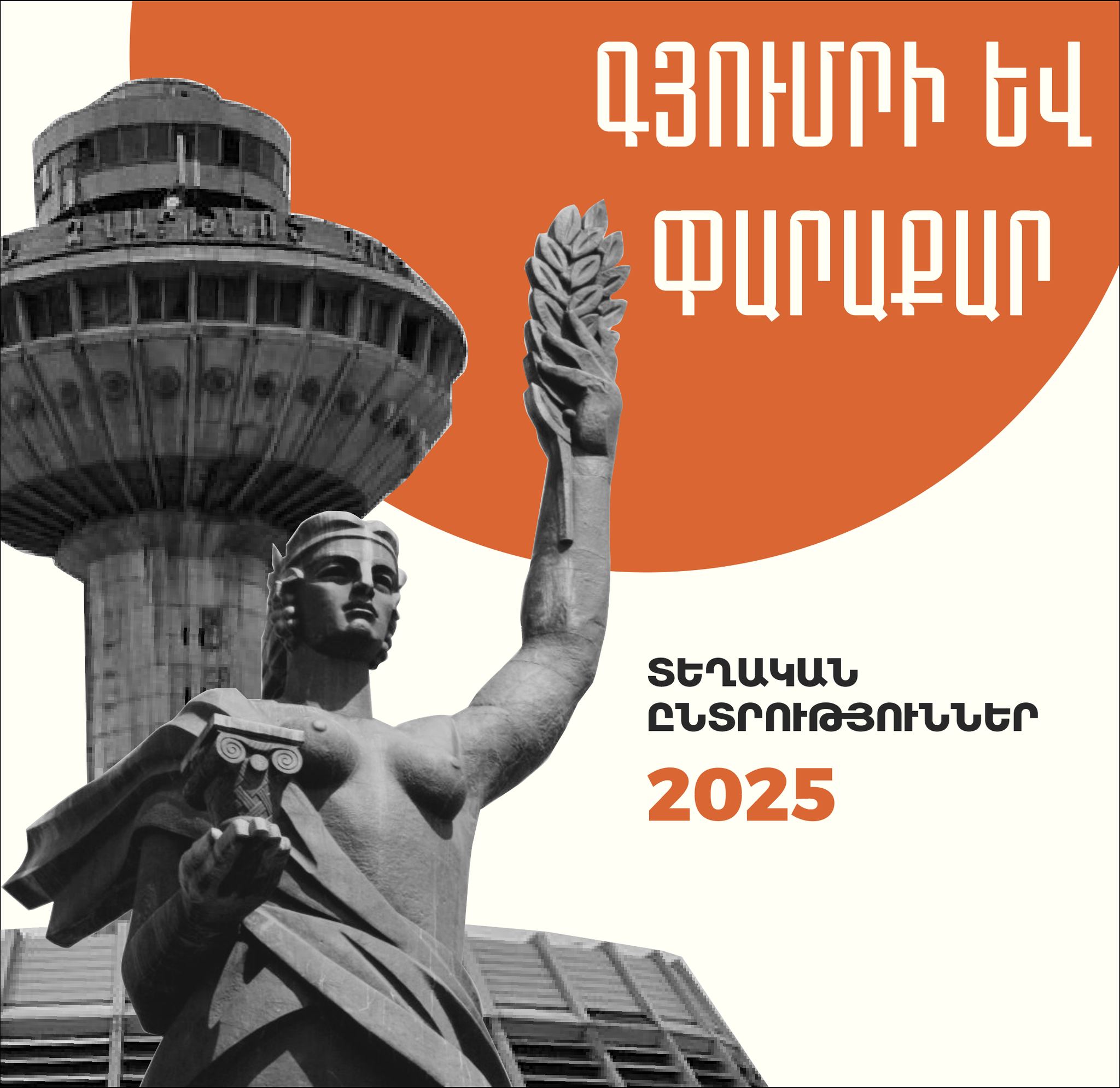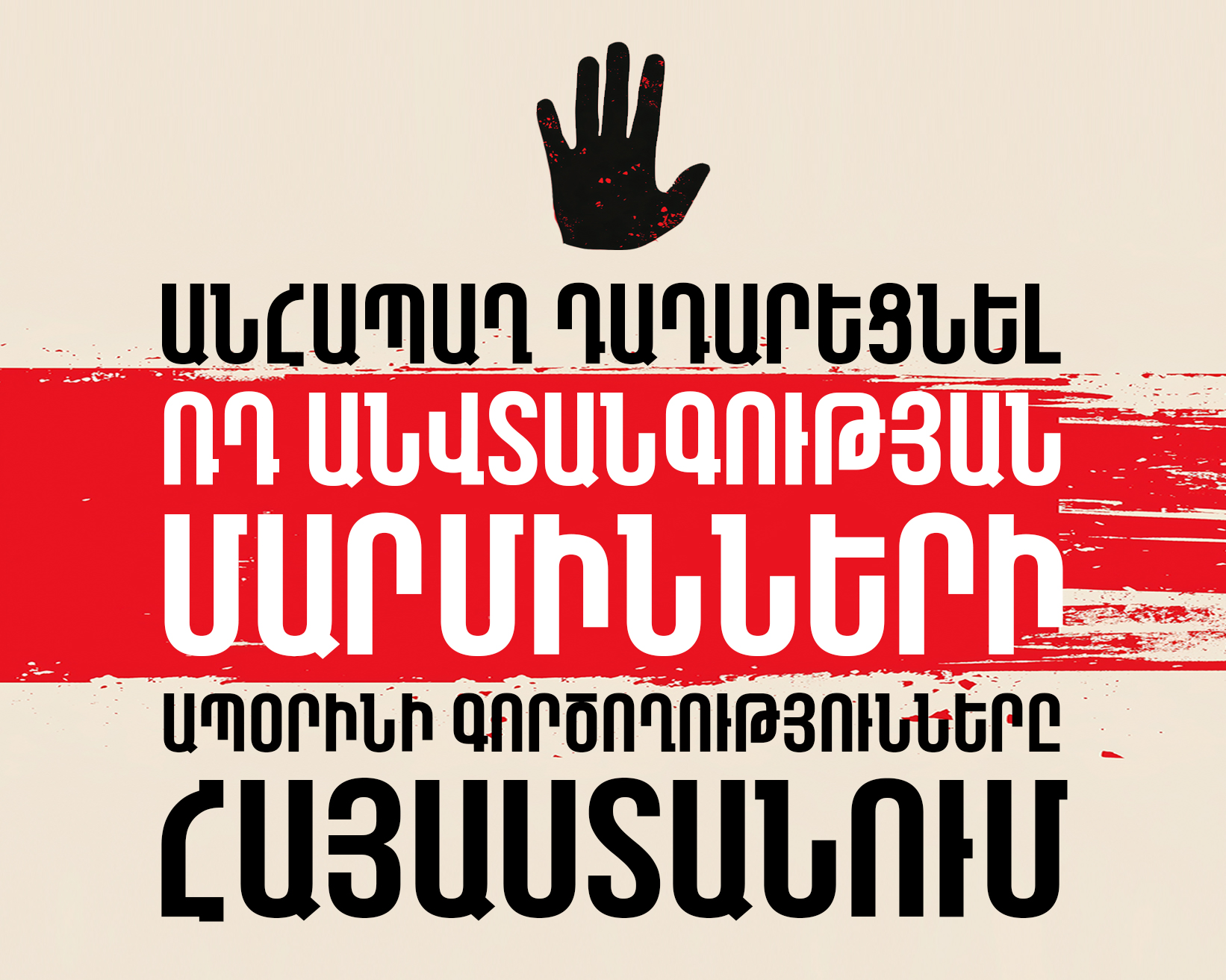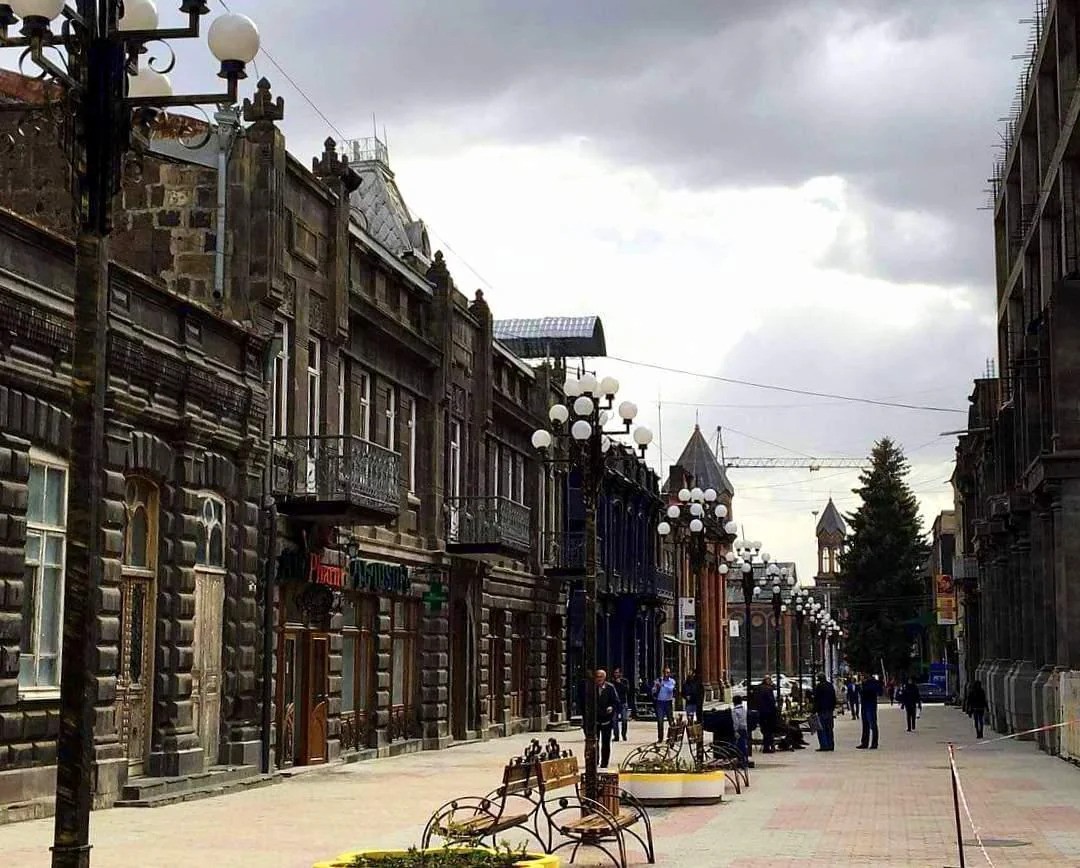




(English) Milano Declaration Reviving the OSCE Comprehensive Security Concept, Rebuilding Democratic Institutions, Revitalising Resilience of our Societies Adopted by the participants of the OSCE Parallel Civil Society Conference 2018 Milano, 5 December 2018

Գործունեություն | Համատեղ | Հայտարարություններ
The OSCE Parallel Civil Society Conference 2018,
NOTING that
The year 2020 will mark the 45th anniversary of the Helsinki Final Act – the founding document of the OSCE,
containing the Helsinki Decalogue which defined the main principles of the OSCE. This was the first
international agreement to introduce the concept of comprehensive security and recognize that not only
political-military measures but also economic and environmental progress and the respect of fundamental
human rights and democratic norms are essential for security and cooperation. As a result, this agreement
signified a breakthrough in the inclusive understanding of common or shared security, especially because it
was adopted at the height of the Cold War.
The basis for the notion of comprehensive security as set out in the Helsinki Final Act allowed for the
development of deeper understanding of this concept and its practical implementation in the OSCE
framework in the 1990s, a time of progressive development of democracy across the OSCE region and positive
cooperation among participating States.
In recent years, however, the OSCE has been struggling to respond to the rapid developments affecting
comprehensive security. It continues to focus its strategies on a traditional and outdated understanding of
the threats. The security threats emerging in recent years such as radicalization/violent extremism, the
undermining of democratic institutions and the rule of law and marginalization of independent media by
authoritarian and nationalist political forces and external hybrid threats by authoritarian regimes are not
being effectively addressed through traditional measures. In the face of this new reality, new approaches
aimed at upholding the rule of law, including international standards, strengthening the democratic tissue
and respect for human rights in societies are of the utmost importance and should inform OSCE actors in
prioritizing their approaches to security challenges.
Measures to guarantee comprehensive security, including the protection of human rights and strengthening
the democratic resilience of society to external and internal threats, should form an ongoing and sustainable
process. Without a commitment to this process, positive achievements will be lost, the fabric of society and
international agreements will wear thin and tear apart, and the system of protection against threats will
weaken or even fall apart.
In the last decade, democratic and legal institutions in various countries across the OSCE region have become
weaker, both in the countries with more established democracies and in states that have recently undergone
democratic transition. In many societies, public trust in mainstream political parties, elected representatives
and politicians, and in the very system of representative democracy and democratic elections is plummeting.
The election process is increasingly becoming a tool for the manipulation and division of society rather than
one of negotiated compromise and democratic agreement.
Since the tragic events of 9/11, State responses to the serious threats of terrorism and violent extremism
have often been based on excessive and unfounded restrictions of fundamental rights and freedoms and on
the bestowing of additional powers to security agencies without sufficient public oversight and accountability.
This has led to an increasing imbalance between the “hard” elements of comprehensive security, on the one
hand, and the elements of the rule of law and democracy, on the other. We believe that the current antiterrorism policies employed by many States are counter-productive, as they increase levels of mutual
suspicion and fear in societies, weaken public trust in the rule of law, and unjustly discriminate against and
marginalize vulnerable or targeted communities, including refugees, internally displaced persons,
communities affected by conflict, minorities, women’s groups, etc. Furthermore, they undermine the
supremacy of international human rights law by eroding the rule of law, and the independence of the
judiciary and the legal profession. This ongoing problem is a major cause for concern.
In addition to the consequences of counter-productive anti-terrorism policies, a number of other factors have
negatively affected the tissue of our societies. Economic crises and austerity measures, including cutbacks in
public health and social service expenditures, have hit many communities and social groups hard. Women
have been disproportionally affected by this, as the burden of care for family members no longer receiving
state support and care has shifted to them and because women tend to be employed in sectors most affected
by job cuts. In many societies, growing inequality, the lack of social participation and inclusion and of
opportunities for education and overcoming social barriers threaten the economic and democratic
engagement of the public, undermine trust in social justice and good governance, and alienate and
marginalize whole communities. In addition, societies are further threatened as people are increasingly
exposed to global dangers resulting from environmental catastrophes and climate change.
Lack of access to justice and the absence of channels for peaceful expression of grievances concerning social
and economic problems and exclusion can lead to the radicalization of members of the public, making them
easy prey for extremist groups. As a result, societies are becoming increasingly polarized, as people are losing
trust in democratic institutions and values and their ability to address social and economic problems.
Authoritarian and nationalist politicians everywhere increasingly exploit the weaknesses of democratic
institutions and the polarization of societies. Engaging in populistic manipulation, they use the challenges of
globalization, dynamics related to increased migration flows, and changes in social and economic societal
structures to intimidate, incite hatred, and ignite xenophobic attitudes. Such politicians call for isolationist
policies and attack international organizations and the system of multilateral agreements. They manipulate
public opinion by whipping up fears of threats to national sovereignty and “traditional values” and by
proposing over-simplified solutions to complex issues and by challenging the universality of human rights.
Having come to power in some states through democratic elections and the use of divisive demagoguery,
these politicians subsequently strive to systematically undermine and destroy democratic and legal
institutions and establish autocratic rule. To maintain their grip on power, they set about eliminating checks
and balances in government, imposing tight controls on public media, suppressing independent media,
undermining judicial independence, amending constitutions, and attacking civil society.
They establish systems of corruption, which then require additional repression in order to be maintained.
Corruption networks often involve cooperation between actors in different States, be they direct financial
participants or facilitators of white-washing operations.
These populist and undemocratic political forces, both in power and in opposition, increasingly use
propaganda and “fake news” to deliberately contaminate the information space and promote notions of the
relativity of truth. The general public, sometimes lacking in media literacy, is thus confused and polarized,
including specifically people in conflict-affected areas (IDP, refugees and others). These actions clearly and
knowingly abuse freedom of information and expression and undermine public trust in independent media.
Whilst claiming to defend traditional values, these forces deliberately attack the rights of women and
minorities, including people with a different sexual orientation and gender identity, members of religious
minorities, migrants, and others. They introduce or revive negative narratives about a perceived “other”, thus
contributing to destabilization and conflict. Exclusive identity policies threaten to destroy the multiethnic
fabrics of societies, including those of the most developed democracies.
As the most extreme phenomenon in this development, undemocratic regimes do not limit their disrespect
for the rule of law and democracy to committing systematic human rights violations at home, but also engage
in militarisation, international confrontation, external aggression and sabotage of the international
multilateral system. They often justify such aggressive actions by alleged concerns about the situation of
ethnic and linguistic minorities in neighbouring states.
Undemocratic regimes are increasingly using hybrid tools of aggression to target weaknesses in other
countries’ political systems and exploit the vulnerabilities in their societies. For example,
meddling in other countries’ elections through the manipulation of social media and news aggregators,
the spreading of “fake news”, and similar actions;
engaging in outright propaganda aimed at undermining public trust in political systems and at
polarization of societies;
exporting corruption by buying politicians, business leaders, and social media to promote the agendas
and interests of foreign undemocratic regimes;
providing financial and other support to political parties on the extremes of the political spectrum in
other countries in order to undermine already fragile political systems;
establishing and enabling GONGOs to work abroad to promote the agendas and interests of foreign
undemocratic regimes;
facilitating and supporting attempts to violently overthrow legitimate governments;
undermining and blocking the work of inter-governmental organisations;
increasing the illegal and often criminal activity of intelligence officers and spies in other countries;
engaging in trans-border cyber-crime to obtain sensitive information and use it in “information wars” or
to destabilise systems supporting vital community services.
Processes that began after 9/11 are now bearing their poisonous fruit. The weakening of legal institutions
and of respect for human rights has led to vulnerabilities in societies that have become targets for new
internal and external threats, such as violent extremism, populist undemocratic political forces, and hybrid
threats from authoritarian regimes. Processes such as polarization, radicalization and exclusion of social
groups, growing intolerance and hatred, mistrust of democratic political systems, loss of individual personal
investment in democratic discussions have led societies to change and become less resilient and less able to
combat the emerging threats which are no less dangerous than traditional threats of military nature.
Only those societies can be resilient to threats where legal channels for expression of grievances function,
channels for political participation are open, access to independent and efficient justice is ensured, and
fundamental freedoms are guaranteed, and where civil society and the media ecosystem are robust.
While the resilience of societies to internal and external threats is decreasing, government policies and
interactions in the framework of international organizations remain focused primarily on the first security
dimension. States frequently view fundamental freedoms and democracy as inconvenient, hampering the
efficacy of actions by the security services, or as too divisive or sensitive to be agreed upon in the sphere of
international relations. If comprehensive security is seen as a three-legged stool, sawing off the third leg, or
the third dimension, causes the stool to collapse.
At the same time, unresolved conflicts in the OSCE region and the high number of internally displaced persons
and conflict-affected people continue to challenge human security across the region, as States fail to address
human security concerns in their current approaches to security policy. Sustainable peace requires
sustainable economic and social structures, prioritising the needs of people.
In the work of the OSCE, strengthening the first dimension at the expense of the third dimension fails to take
into account sufficiently the evolving structure of our societies and the new types of threats. As society
develops and the information space changes, not in the least due to the rise of social networks and new
media, the traditional elites are losing their influence and power. Agenda is no longer set exclusively by
mainstream politicians, traditional media and academia. The agenda setting is increasingly dispersed among
different actors and is frequently manipulated by bearers of flawed and dangerous ideologies. At the same
time, civil society organizations, civic journalists and bloggers, grassroots movements and individual activists
are also active in the changing public space, working to counter flawed ideologies and advancing their own
agenda. Ignoring this evolving reality, continuing to count only on the social actors of the past and not
cooperating with new actors of positive social change concedes public space to all sorts of dangerous
ideologies and populist manipulators. Moreover, it undermines the ability of states and international
institutions to detect and respond to early warning signs of impending crises.
We are worried that the issues of fundamental rights in the OSCE third dimension work have been pushed
aside lately, with the focus shifting to other issues perceived as less divisive for the dialogue between
participating States. Programming of the OSCE’s work in the human dimension
to identify effective responses to contemporary challenges it is important to overcome the existing division
within the OSCE into academic experts and expert-practitioners on fundamental rights and social issues. All
actors need to work together cross-dimensionally as their knowledge and experience complement one
another both in theory and practice.
The search for a solution to address new threats lies not in separating but in amalgamating all three
dimensions. Prerequisites for this include cooperation among all actors, including governmental and intergovernmental bodies, on the one hand, and civil society, media, academia, and business, on the other. An
inclusive cross-dimensional approach should be adopted to find practical solutions in all dimensions.
***
CONVINCED that implementation of the above goals falls under the competences and responsibilities of all
OSCE actors, including the Chairmanship, participating States, and autonomous institutions;
CALLS on all OSCE actors to engage in a discussion on the revival of the Helsinki Final Act concept of
comprehensive security, to ensure it is relevant to new internal and external threats and current realities.
Such a discussion should focus on the need for the OSCE to make a conceptual shift in its approach to ensure
practical implementation of the comprehensive security concept and move from compartmentalization to
synergy of all three dimensions. This change should aim to reinforce democratic institutions, the rule of law,
and resilience of societies to respond to emerging threats. It is imperative to engage in discussion and analysis
of the causes of profound ongoing developments across the globe. This discussion should be a matter of
priority in the run-up to the 45th anniversary of the Helsinki Accord. The current and incoming OSCE
Chairmanships and the heads of institutions as well as the OSCE Secretary General should take the lead in
facilitating this discussion;
CALLS on OSCE institutions and participating States to react more proactively and consistently to situations
when political forces in OSCE participating States, in any part of the OSCE region, attempt to undermine and
destroy democratic and legal institutions, eliminate checks and balances in government, undermine judicial
independence, amend constitutions, put public media under control, suppress independent media, incite
hatred, ignite nationalistic and xenophobic attitudes, and attack civil society. Such internal threats to our
societies and the founding principles of the OSCE cannot be ignored, even if reacting to them appears to lie
outside the current mandates and competencies of OSCE actors;
CALLS on OSCE institutions and participating States to increase attention for new threats to the health of
democratic institutions, inclusive participation of all in democratic processes, upholding the rule of law,
countering corrupt governance, creating an inclusive society, creating conditions for diversity in the media,
and observing fundamental rights in the OSCE’s human dimension work and cooperation programs, and to
consolidate key human dimension commitments to ensure they are relevant to contemporary challenges;
CALLS on all OSCE actors to acknowledge that a robust independent civil society is a legitimate actor within
the OSCE, a key pillar of comprehensive security and of a resilient society, and to ensure that space for civil
society expands in OSCE work in all three dimensions, at all levels, both national and international. All OSCE
actors should engage more proactively in practical action to protect and expand civil society space;
CALLS on all OSCE actors working in/on conflicts in the OSCE region to consult and cooperate systematically
with civil society actors in their work on all stages of conflict cycle;
CALLS on all OSCE actors to reiterate that free, diverse and pluralistic media of diverse ownership, together
with vibrant communities of civic journalists and bloggers, are essential to ensuring inclusive public
discussion, countering propaganda and fake news, and achieving the resilience of our societies to internal
and external threats. Participating States and the OSCE Chairmanship should provide all necessary support to
the office of the OSCE Representative on Freedom of the Media in its work in this field;
CALLS on the OSCE Representative on Freedom of the Media to develop programmes to increase media
literacy in our societies, including assistance in developing mandatory curriculum courses for different
educational institutions. The office of the RFoM should continue its work in addressing the problem of
propaganda and hate speech as they undermine freedom of expression, and in assisting participating States
and civil society to develop effective responses to these hybrid threats;
CALLS on the OSCE Representative on Freedom of the Media and participating States to develop new
approaches to developing and supporting public discussion in our societies, based on positive narratives and
taking into account the increasing polarization of societies and the specifics of social and new media;
CALLS on all OSCE actors to adopt inclusive approaches in developing responses to hybrid threats, taking into
account modern societal structures and involving all actors, including civil society and media experts;
CALLS on all OSCE actors to protect and ensure academic freedoms in participating States, providing for full
independence of academia and their involvement in developing responses to counter new threats, address
issues of social and political development, and strengthen social resilience;
CALLS on participating States and all OSCE actors to develop solid and comprehensive policies to address
gender equality and develop inclusive mechanisms for the equal participation of women at all levels, taking
into account the OSCE Gender Action Plan, the Vienna 25+ Declaration, Women, Peace and Security Agenda,
Youth, Peace and Security Agenda, and the Guidelines on Security of Human Rights Defenders;
CALLS on participating States and all OSCE actors to develop solid and comprehensive policies on dealing with
migration, which would include thorough integration and eliminate the ghettoization of migrants; to conduct
urgent consultations on the situation of internally displaced persons and conflict-affected populations
throughout the OSCE region and elaborate strategies for their inclusion;
CALLS on OSCE/ODIHR to proactively assist participating States in strengthening and developing the rule of
law, independence of the judiciary, and realization of fundamental freedoms to ensure that justice is
accessible, and that legitimate and peaceful channels of communication of grievances are open in order to
better protect our societies from radicalization;
CALLS on all OSCE actors, including the OSCE Secretariat, to develop new approaches in the second dimension
to fighting internal and trans-border corruption, including in the political sphere;
CALLS on civil society organizations, media, academia, citizens and politicians concerned about the future of
security and cooperation in Europe and sharing our preoccupation with emerging security threats that are
not adequately addressed by traditional approaches to security policies, to engage in discussions and efforts
to identify solutions to overcome negative trends and strengthen our societies and common security;
OFFERS civil society cooperation in designing and implementing these strategies and practical approaches to
reviving the concept of comprehensive security, rebuilding democratic institutions, and revitalising the
resilience of our societies.


